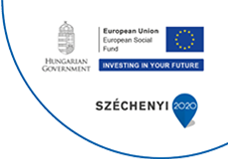The project
Complex, comparative analysis of the interactions between regular health promotion physical activity, quality of life, motor abilities and body composition among students living in the Carpathian Basin within the framework of a Hungarian-Romanian-Slovak cooperation project
EFOP-5.2.2-17-2017-00035
The purpose of the cooperation and research planned in the framework of this Hungarian-Romanian-Slovak cooperation project is to prove the beneficial effects of regular health promotion physical activity including the school PE lessons on body composition, motor skills and quality of life. The basic concept is that the regular, daily physical activity, so the everyday PE in schools in Hungary has more significant positive effects than the two or three PE lessons per week that is applied in practice in Romania or Slovakia. The project can also answer the question of how the changes in body composition are related to the development of motor skills. Furthermore we can investigate how these two indicators correlate together with the changes in the quality of life of the participants. The basic idea of the project is the fact that since the autumn of 2013, everyday PE lessons has been introduced in Hungary in primary and secondary schools within the framework of statutory regulations, which means 5 PE lessons per week. The purpose of this provision is to educate a healthier lifestyle, prevent various diseases and thus ensure a better quality of life. In contrast, students in public education currently have 2-3 PE lessons per week in other countries of the Carpathian Basin. Moreover, some aspirations would like to reduce this number of PE lessons. Numerous studies have proven the positive effects of regular physical activity on motor development or physical, cognitive and social abilities. The progress in these areas also contributes to a better quality of life of the children concerned. As a counterpoint, these articles emphasize that the number of overweight children due to lack of physical activity increases in the Carpathian Basin and all over the world, and as a result, the number of children with mobility problems increases as well. Childhood overweight can be the starting point for a number of additional adult complications (abnormal obesity, movement problems, type 2 diabetes mellitus, hypertension, metabolic syndrome, etc.) that greatly contribute to the deterioration of the quality of life. One of the options to prevent these problems is the regular physical activity in school education, the increase in the number of PE lessons, and the regular physical activity as a daily routine.
In Hungary, the efficiency of everyday PE is not yet monitored in the lower classes of primary school. However, students' body composition and motor skills are measured in every semester from the 5th grade using the NETFIT system. Such a complex measurement system based on a state regulation is not used in other countries of the Carpathian Basin. The above-mentioned facts make the development of an international measurement system for comparative analysis relevant and justified in the three countries. This measurement system follows up and accurately examines the physical abilities, body composition, motor skills and quality of life of the schoolchildren from the 1st class. To study the above-mentioned issues, after the initial assessment of physical abilities, body composition, motor skills and quality of life, we would perform the same examinations once in every semester during two school years, follow up the same indicators with the participation of at least 100-100 children per country. So the direct target group of the program is the children from Szeged and over the border who are newly enrolled in 1st class in school education after nursery. Thereby, these pupils are newly join in the system of everyday PE in Hungary and the system of 2 or 3 PE lessons per week in Romania or Slovakia.
During the measurements, we would use the following tests and methods:
- Physical abilities: measuring body weight, body height with antropometric tools
- Body composition: measuring absolute and relative body fat and muscle content, basal metabolic rate and body mass index with bioelectric impedance analysis (Omron BF 511 body composition monitor)
- motor skills: Test of Gross Motor Development (TGMD) (The TGMD is partly identical to the tests of the NETFIT system used in Hungary. Validation of the TGMD in every participant country is part of the project. This is a necessary step in preparing the actual research.)
- Quality of Life: Hungarian, Romanian and Slovak versions of KidScreen-27 questionnaire’s parent and children versions
In addition to the practical implementation of the research, we are planning to develop a website presenting the project, where the results of the research would be published online.
Moreover, we are planning professional workshops, study trips abroad, and dissemination conferences as well.
EFOP-5.2.2-17-2017-00035
The Foundation for the Sustainable Development of our Society
( H-6725 Szeged, Szent Ferenc u. 23. III/21. )
Amount of support: 31 651 906 HUF
Support percentage: 100%
Beginning of the project: 01. 01. 2018.
Closing of the project: 12. 31. 2019.


